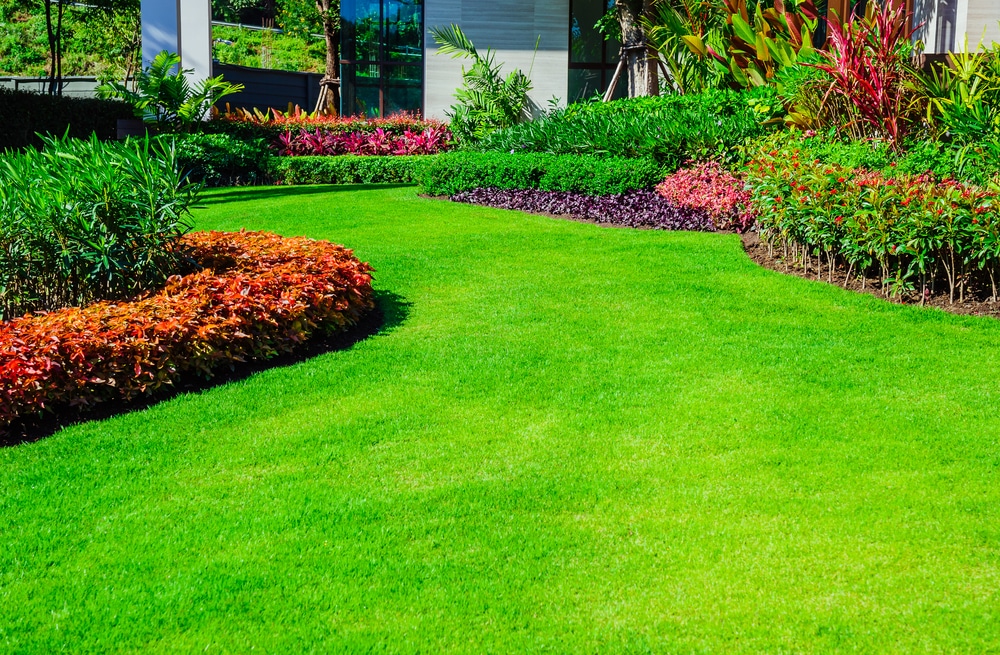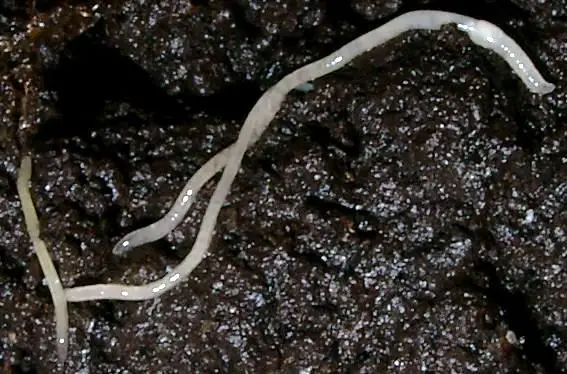Summary
Pot worms live in your soil whether you notice them or not. They’re very small, translucent, white to gray in color, and look just like other worms.
They’re present in your soil to help break down dead organic matter. Doing so provides nutrients to your plants. As they move through your soil, they create tunnels that increase air and water flow.
An overabundance of pot worms likely means your soil has too much moisture in it. This could be due to issues such as overwatering or lack of drainage.
Coincidentally, pot worms help solve some of these issues due to their burrowing. However, you may need to take additional steps such as helping improve the drainage with structures or adjusting slope, or reducing how much you water.
Identifying
Look for the following factors to identify pot worms (enchytraeidae):
- Millimeters in length
- Translucent
- White to gray in color
- Slender body
- They wriggle to move
- Decaying organic matter (more on that below)
- Overly moist or overwatered soil (more on that below)
However, please note that even if the organism you’re seeing ticks off all these boxes, we recommend consulting with a local gardening professional. They’ll know your area better and can help you officially determine what’s in your soil as well as what to do about it, if anything.
Causes (Why They’re There)
Pot worms are likely already in your soil.
You probably didn’t notice them before because their population was small compared to other soil organisms.
So, first, it’s normal to have pot worms in your soil. Their job is to help break down decaying organic matter, so they’ll be present in your compost, garden, and soil for potted plants.
However, noticing lots of them is a sign your soil is overly moist or overwatered. Pots are susceptible to these issues due to their limited size, limited drainage, and potting soil composition.
Benefits
Pot worms’ primary benefit is breaking down dead organic matter in your soil. However, they also help provide nutrients to your plants, and their burrowing improves soil texture as well.
Let’s start with breaking down dead organic matter.
Breaking Down Dead Organic Matter
Pot worms are detritivores. It’s a scientific term for any organism that feeds on dead organic matter.
Hopefully, it’s obvious, but without detritivores, we’d have a whole lot of dead organic matter lying around. Detritivores are kind of like janitors in that way (also very necessary and awesome).
However, the fact that organisms like pot worms feed on dead organic matter also has another benefit.
Providing Nutrients To Your Plants
Anytime organisms like pot worms break down dead organic matter, they consume and process it, and transform it into beneficial nutrients. They release these into the soil, which your plants then absorb through their roots, improving their growth.
Improving Soil Texture
This benefit actually covers two.
Pot worms (and other worms) burrow through your soil. It doesn’t matter to them if this soil is in pots or your backyard. They’re going to burrow regardless.
Burrowing is beneficial for soil texture because it aerates the soil, which is necessary for plants and other organisms to get oxygen. This also helps prevent soil from becoming compacted. Soil that isn’t compacted allows plants’ roots to grow through it easier, water to move better, and, again, air to flow better.
Problems
Pot worms are unlikely to cause any direct problems. The primary associated problem you need to be concerned with is what an overabundance of them in your soil means.
Though they are a normal part of any healthy soil web, you have too many pot worms if you begin to notice them regularly.
Specifically, this indicates a problem with overly moist or overwatered soil.
Overly Moist Or Overwatered Soil
All kinds of reasons exist for overly moist or overwatered soil, including but not limited to:
- Lacking drainage
- Compacted soil
- Extreme rain
- Overwatering
It’s worth noting again that pot worms can help solve the first two problems. As they burrow, they create tunnels in the soil, improving drainage and reducing compaction.
This helps alleviate issues with the second two problems, but you’ll have to take additional steps to truly solve them.
For extreme rainfall, you can build structures to help with drainage or regrade soil to direct it away from your garden.
For overwatering, you’ll need to reduce how much you water. Be careful of overcorrecting, though. Watering too little has adverse effects as well.
To prevent this, monitor your plants over a period of time as you adjust watering.
Is It Good For Your Lawn And Garden?

Pot worms are good for your lawn and garden.
They provide many benefits, such as the aforementioned improvements to soil and the provision of nutrients to your plants.
But, as also previously mentioned, too many is, unfortunately, a big sign you’re either overwatering your soil or it isn’t draining properly.
Attracting
You don’t have to do much to attract pot worms. In fact, you don’t really have to do anything at all.
Whatever organic matter you have is eventually going to die. That doesn’t mean the whole plant, though. It could just be sticks, leaves, petals, etc.
It’s a natural and normal part of life and gardening, and it will attract pot worms. You probably won’t notice them, though, not unless your soil is retaining too much water.
Support And Care
You don’t have to do anything to support and care for pot worms other than to continue gardening as normal. They’ll take care of themselves.
However, if you’re still interested in a way to help them and other beneficial garden soil inhabitants (which is great!), just make sure you’re watering your soil as normal. Overly dry soil impedes a healthy soil ecosystem and garden.
Treating
You don’t need pesticides to treat pot worms. Pesticides cause more harm than good.
Instead, focus on why they’re there (water issues) and treat those. Eventually, the population should stabilize.
If it doesn’t, consult a local gardening professional. Again, stress you’re looking for natural methods of population reduction.
Preventing
You don’t need to worry about preventing pot worms. Additionally, doing so is a losing battle.
As with treating them, it’s better to focus on what’s causing so many of them (if you have too many of them). Ultimately, that will be better for your soil, plants, and everything in it.
